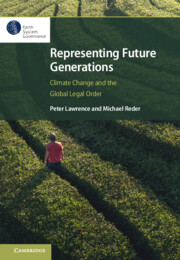Book contents
- Representing Future Generations
- Series page
- Representing Future Generations
- Copyright page
- Contents
- Preface
- 1 Introduction
- Part I Normative Framework
- 2 Proxy Representation and the Global Legal Order
- 3 The Democratic Ideal and Its Normative Value for Future Generations
- Part II International Law and Institutions
- Part III Case Studies
- Index
- References
3 - The Democratic Ideal and Its Normative Value for Future Generations
from Part I - Normative Framework
Published online by Cambridge University Press: 19 September 2025
- Representing Future Generations
- Series page
- Representing Future Generations
- Copyright page
- Contents
- Preface
- 1 Introduction
- Part I Normative Framework
- 2 Proxy Representation and the Global Legal Order
- 3 The Democratic Ideal and Its Normative Value for Future Generations
- Part II International Law and Institutions
- Part III Case Studies
- Index
- References
Summary
In Chapter 3, firstly, we reconstruct central theoretical models of democracy and enquire how an expansion of representation mechanisms for future generations could be conceptualised within these justificatory narratives. Secondly, we analyse the values that underlie democratic practices which can be helpful for advancing proxy representation at the international level by providing ethical criteria for such reforms. This involves analysing the discourses of intergenerational justice, solidarity and vulnerability. The chapter then turns to examine how these discourses can be translated into political forms of proxy representation by drawing on the all affected principle which requires that those affected by a decision have a role in the making of that decision, which is argued to be an element of most, if not all theories of democracy. This in turn is hypothesised to provide a basis for extension of the demos to include future generations, which then justifies proxy forms of representation to enable their representation . Human rights are argued to constitute a practice of global values which provides a powerful normative orientation for climate law and policy-making.
Keywords
Information
- Type
- Chapter
- Information
- Representing Future GenerationsClimate Change and the Global Legal Order, pp. 48 - 90Publisher: Cambridge University PressPrint publication year: 2025
References
Accessibility standard: WCAG 2.0 A
Why this information is here
This section outlines the accessibility features of this content - including support for screen readers, full keyboard navigation and high-contrast display options. This may not be relevant for you.Accessibility Information
Content Navigation
Allows you to navigate directly to chapters, sections, or non‐text items through a linked table of contents, reducing the need for extensive scrolling.
Provides an interactive index, letting you go straight to where a term or subject appears in the text without manual searching.
Reading Order & Textual Equivalents
You will encounter all content (including footnotes, captions, etc.) in a clear, sequential flow, making it easier to follow with assistive tools like screen readers.
Structural and Technical Features
You gain clarity from ARIA (Accessible Rich Internet Applications) roles and attributes, as they help assistive technologies interpret how each part of the content functions.
